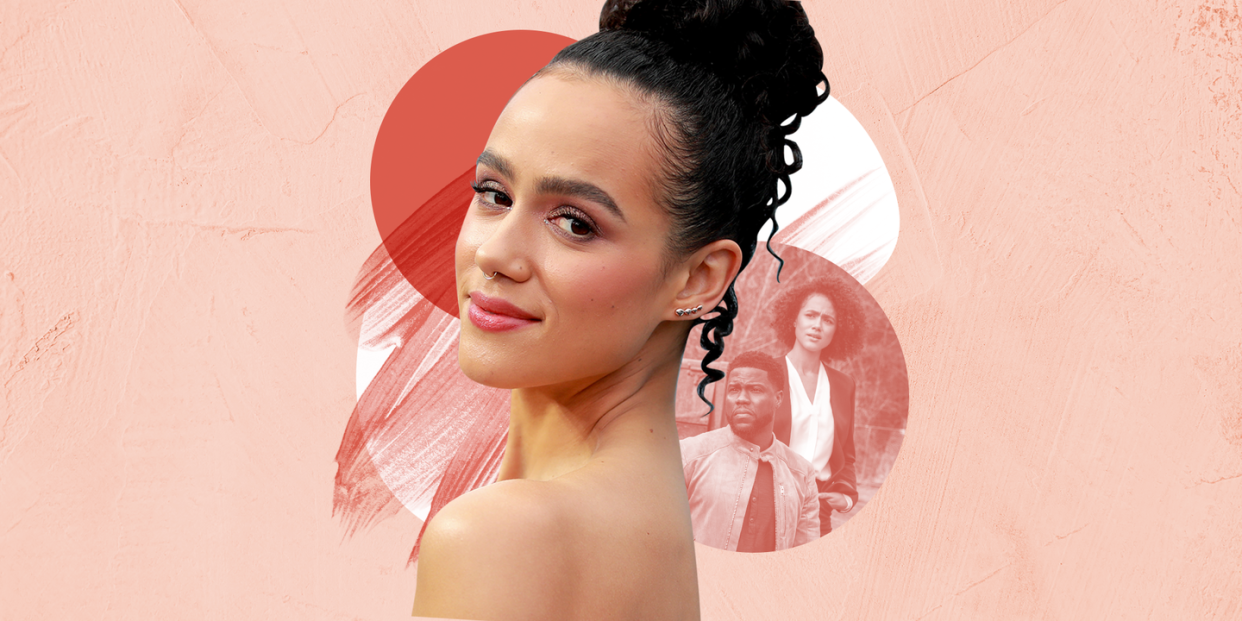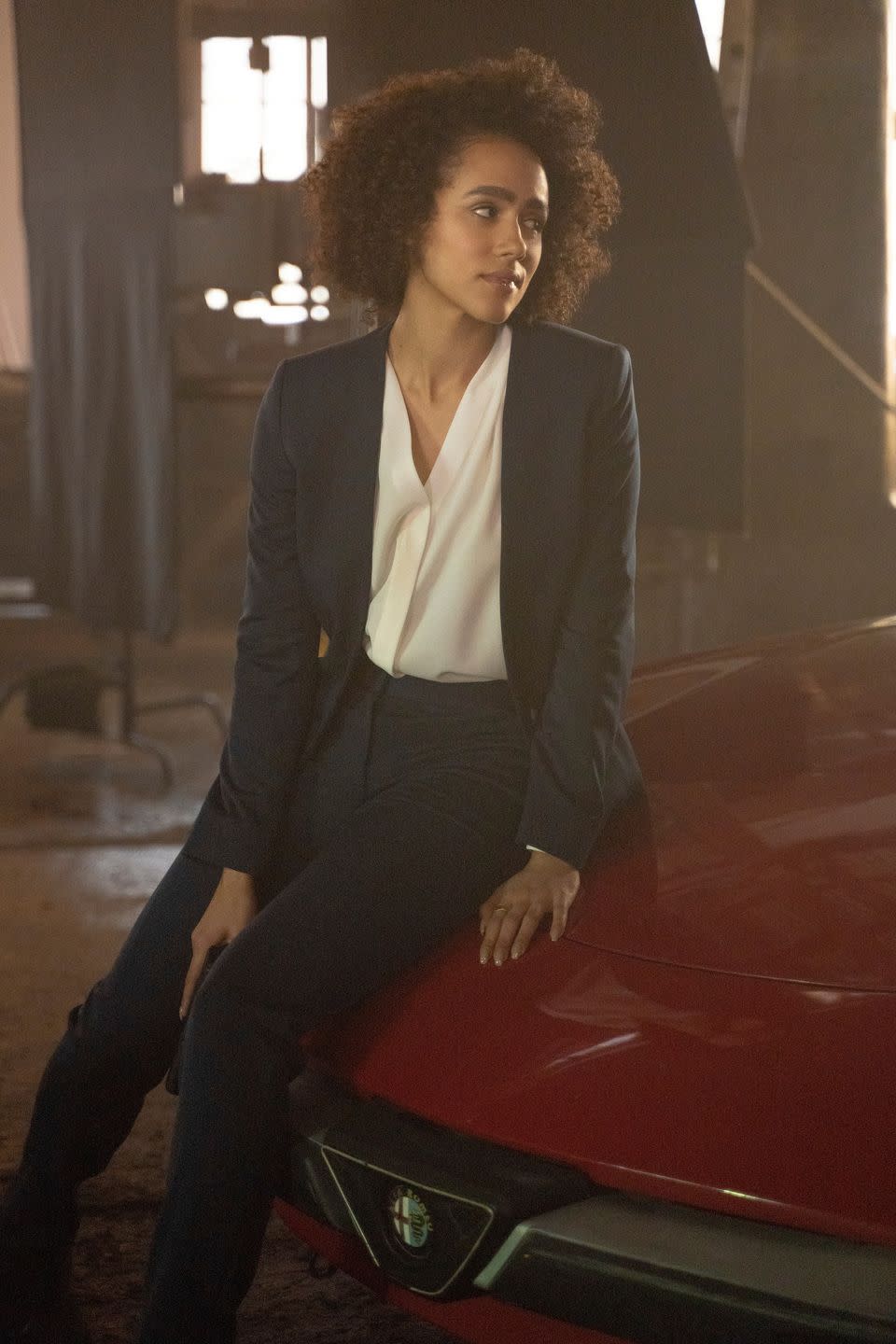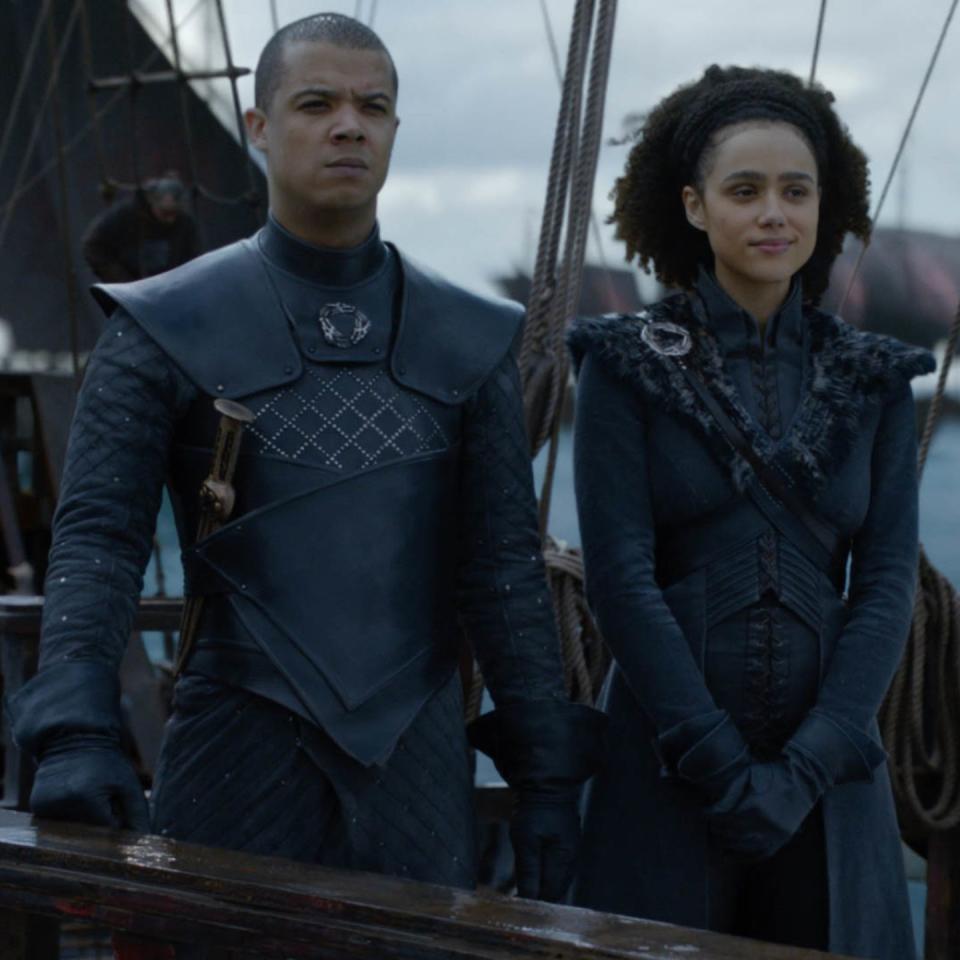Nathalie Emmanuel Knows the Importance of Self-Care During Times of Protest

Nathalie Emmanuel’s resistance has taken on many forms. She’s marched in London’s Hyde Park to protest the unjust deaths of George Floyd, Breonna Taylor, Shukri Abdi, and countless other lives lost to racism. She’s volunteered, donated money, fundraised, shared anti-racism resources on social media, and checked in with loved ones. But as much as possible, she’s also practicing self-care, which can be an act of defiance for Black women—just ask Audre Lorde. “You can’t take care of other people unless you take care of yourself,” Emmanuel tells BAZAAR.com.
For the 31-year-old actress known for playing Missandei on Game of Thrones, self-care has consisted of quiet activities during lockdown at home in London: reading, cross-stitching, teaching her family yoga, cleaning the house, and, most importantly, unplugging from the Internet to make time for healing.
“I’ve been looking at certain content that is really traumatic, and scary and sad, and all of the bad news that we have at the edge of our fingertips all day, every day,” she says. “[Know] when it’s time to put your phone down and just kind of unplug, because while social media is so great for so many things, such as getting information and spreading information quickly to lots of people very quickly, there’s a negative side to it.”
Emmanuel is learning about systemic racism just as she is teaching during this time. “It’s important that we all educate ourselves,” she says. “It’s quite frustrating to me that, for me—as a cisgendered, able-bodied, born-in-the-West, educated, light-skin, Black, mixed woman—I can still identify my privileges in life, even though I’ve experienced a lot of discrimination and inequality. It’s really hard and frustrating when people deny that they have any privilege at all. I never quite understand it, because I think that’s just choosing ignorance and just rejecting that someone’s experience is real.” Compassion, however, is key. “I just hope that people can start to find common ground, because that’s the only way that we can move together, forward as society, as humanity, if we do it together.”
A post shared by Nathalie Emmanuel (@nathalieemmanuel) on Jun 27, 2020 at 10:25am PDT
The actress is looking to her own industry when it comes to enacting change. “I’m used to just being on sets that are mostly white. And then I’m probably one of maybe two or three—which is rarer—people of color,” she says. “There’s so much untapped talent that’s not being utilized. And I think that’s just such a shame.” She says film crews, hair-makeup departments, wardrobe teams, all the way up to executive positions and BAFTA voters are lacking in diversity. “We need to actively hire Black people and other people of color into the industry in every single way. And hopefully then we will see actually long-lasting change.”
More than a year since the Game of Thrones finale, Emmanuel has moved on from Westeros to rom-com territory in Hulu’s Four Weddings and a Funeral and now into the action realm with Quibi’s Die Hart, in which she costars with Kevin Hart and John Travolta as an action hero-in-training named Jordan King. Emmanuel has already dabbled in the genre, however, through roles in the Maze Runner and the Fast & Furious franchises. Next, she’d like to dive deeper into plays and indie dramas (hopefully directed by Candyman’s Nia DaCosta if the latter).
Emmanuel won’t belittle Die Hart though; each of the comedy’s 10-minute episodes offers insight into the current climate, she says. “Kevin’s character and my character [have] both been put in a box, and the world has told them what they are and what they can be. I think in this moment right now, where we’re talking about equality and equal opportunities and all of that, the world telling certain groups what they are, and that affects how they’re treated in the world.”
The quick-stream series also offers some much-needed humor. “With the intensity of this health pandemic, and the pain and the legacy of that, as well as people fighting for racial equality, we just need a good laugh.”
Plus: “My character is a complete badass in this,” Emmanuel says, crediting stunt coordinator Walter Garcia and her stunt double, Diandra Stoddard. Even with Die Hart’s abbreviated format, filming “ran like a usual set”—what felt new were the action sequences, which just might influence her next role.
“I did a lot of the fighting, and it was amazing to delve into that, because I hadn’t before,” she says. “I’m just so grateful to them, because now I’m like, ‘I want to be a superhero.’ I’m like, ‘I need to play a vigilante. A badass vigilante.’” We sure hope she does.
BAZAAR.com catches up with Emmanuel about her new project, looking back at GoT, and how the entertainment industry—and the world—can substantively dismantle racism.
I’m curious about how you shot Die Hart considering it was for Quibi and all the episodes are 10 minutes long. Did it feel different?
Not particularly. I might just be really oblivious to things going on around me, which is possible. But the script itself read very much just like a slightly shorter feature film. When we were filming it, I know that on a technical level, from the camera point of view, they had to make sure that the scenes were shot in two [dimensions]—one’s portrait, one’s in landscape mode.
I’m sure the person who would have the most to say about the difference in shooting will be the camera guys and that whole department. But for me, I just had the freedom really to have fun with Jordan and play with that character.

Has it hit you yet that it’s been a year since the Game of Thrones series finale?
I remember the Internet told me when it was a year. With everything that’s been going on, it passed me a bit. But the Internet told me that it was a year ago since Missandei died, and it’s a year ago since the finale. And it’s just amazing how quickly time flies. It’s such a bizarre thing, because it feels like yesterday, but it also feels like a lifetime ago. Just so much has happened since. And I’ve been working on various things since. It’s a strange sensation, but I think because that show is such a huge part of my life, and my career, and Missandei is a big part of me in a way, I think I’ll always carry that character and that time with me, and everything I learned.
It’s strange when people remind you, you’re like, “Oh, yeah. Oh …” And you find yourself reminiscing and looking at pictures. A lot of us have all kept in touch, and just reaching out to people and just being like, “Oh, guys, it’s been a year.” So that’s happened a bit, and it was lovely. But I miss it, man. I think it was such a special thing that we did. What is life without Game of Thrones?
Is there a trait or lesson from Missandei that especially sticks with you?
Missandei stayed kind and graceful and dignified despite unimaginable pain and suffering. She just represents something that so many people experience, just pain and oppression, and just still being the best that you can be, and be a good person, and be a kind person. And it's so easy for trauma like that to make people angry. Trauma just can make people really unhappy and really angry. And she just wasn’t. But she had a fierceness, a quiet confidence and a quiet strength. I have to muster that sometimes for me. And I think she really represented that so well.

Definitely. Especially watching last year, Missandei and Grey Worm represented a lot for Game of Thrones fans and people of color who watched the show and were seeing themselves on the screen when there wasn’t a lot of representation in that realm.
Absolutely. Missandei and Grey Worm were very much existing in a predominantly white world, and that is an experience I 100 percent relate to. I grew up in an area like that, so I completely can relate to the journey and the struggles of that, whilst very different, I can imagine. I think that those characters, like you said, had to represent a lot of people, because it was just them. And I think the kind of response to Missandei’s death, and those characters just in general just really speaks to why representation is so important, and how going forward when we’re making big shows like this, that representation looks more like the world that we live in.
Hopefully, people will be aware of that going forward in the future. Not to say that that part just didn’t completely change my life; I was incredibly grateful for the chance to play Missandei, because I just loved her as a character, and the beautiful stories that I got to tell. Her story was one of the greatest joys of my career. So it’s like [there are] two sides to it, but I’m so grateful that the conversation around these things happened because of the number of eyes that were on it when the show finished. So that can only just push the consciousness forward in some way.
On the topic of representation, there’ve been lots of changes with casting, new shows, and creative decisions that helped elevate people of color or Black people in the industry recently. Do any of these changes seem sustainable to you? Does it give you hope at all?
Yeah, of course. Every time you see a story that isn’t just centered around white people, I feel it’s a step in the right direction. I’m not saying that stories that are centered around white people should never be told again, but that there is opportunity for everybody to have their voices heard. But for me, I always feel like there is this moment where there’s this outrage about certain issues around inclusivity and representation. And then there’s this flurry of films made, and opportunities are given to Black filmmakers and writers and actors. And then it goes back to the way it was. I think this issue can only be resolved when people in power, in powerful positions, are actively hiring Black talent and Black creatives at every level. And not just in front of the camera.
It’s got to be in the writing rooms, in producing teams, in directors, and all the way up the ladder. That’s true for not just Black people, but for every minority group that feels underrepresented in film and television. That’s a systemic change, and that just has to happen if we don’t want to fall into these traps again of just amplifying one certain group’s voice. Because to be honest, when that happens, when you get this flurry of films that come out, there’s something that you celebrate.
But it’s also something that needs to be replicated over and over and over again. And not just because people don’t want to be seen as racist, so it almost feels performative. You need it to be like, “I’m a studio exec, I’ve got power. Let me find and work with actors or filmmakers that are completely outside of my usual remit.” That takes action from people in power. And I think that is the only way we’re going to see it change in a long-term sense.
We’ve seen the gradual changes, and so many of those things have been so great and makes you really hopeful. But like I said, there’s always going to be a part of me that’s just going to be slightly skeptical, slightly cynical, about whether that change is ongoing and lasting.
Zooming out to our everyday life, what does lasting change look like for you—that’s not performative, that’s actually genuine?
It looks like your race not being criminalized, and being poor isn’t being criminalized. And it means that you have equal opportunity in education, in the criminal justice system, in health care, in literally every aspect of life. Just having your sense of peace walking down the street, or sitting on some grass outside of a church, or walking through a shop without being followed by security, or someone grabbing their bag because they think you might steal it on the bus or in a restaurant. All of these things, like not dying in childbirth because people don’t believe your pain, and in every single element that exists of society—that Black people can exist and be treated with the respect and dignity that they deserve, because they’re human beings. And that dignity and respect isn’t just reserved for one group of people or specific groups of people.
And it just has to stop. We keep seeing these examples over and over and over again. And we, as the Black community, are just sick of—it's frustrating to even speak on it on behalf of the Black community, but the Black community is sick of screaming about this and saying, “Look, this is happening, this is happening,” and people dismissing it as something as isolated and that we’re exaggerating.
It’s important to just distinguish the fact that I live in England, and my experience would have been very different here. And as a mixed woman as well, like as a light-skinned Black person, obviously, that is just the truth. But it’s just important to know that this is all rooted in the same evil, in my opinion. And it’s just got to be weeded out. And everyone’s been talking about how coronavirus is a pandemic and is a virus, and so is racism. And we need to do what we need to do now to stop it. I’ve got a nephew who is very little and I’m like, “I don’t want him dealing with this as a young, brown-skin, Black mixed man. I don’t want him dealing with that as a teenager. I just want him to be safe.” And that's just the bottom line.
Absolutely. Thank you for sharing that.
Of course. It’s not my pleasure, but I wish I didn’t have to talk about this stuff. I wish that we didn’t have to march in the streets, we didn’t have to just ask people to do their jobs. I just wish that we didn’t have to do it, but I’m in a very privileged position where people want to know what I think about things. And so it’s my responsibility to say what needs to be said.
People always are like, “Oh, well, you’re just this actress. What makes you think we care about your opinion?” And I’m like, “Well, you might not, and that’s fine.” And I am an actress. And I’m not a politician. I’m not an academic. I’m not the most well read. I don’t necessarily have all the facts lined up. I understand that completely. But I am a human being. I’m a person. I have lived in this body my entire life. I know what that experience means. And I know that there are people experiencing worse than me, like, significantly worse than me. And so because I understand that pain of racism, I understand the additional pain of sexism, I just want to stand with people who know this pain and help rise us all up. That’s all I want.
This interview has been edited and condensed.
You Might Also Like

